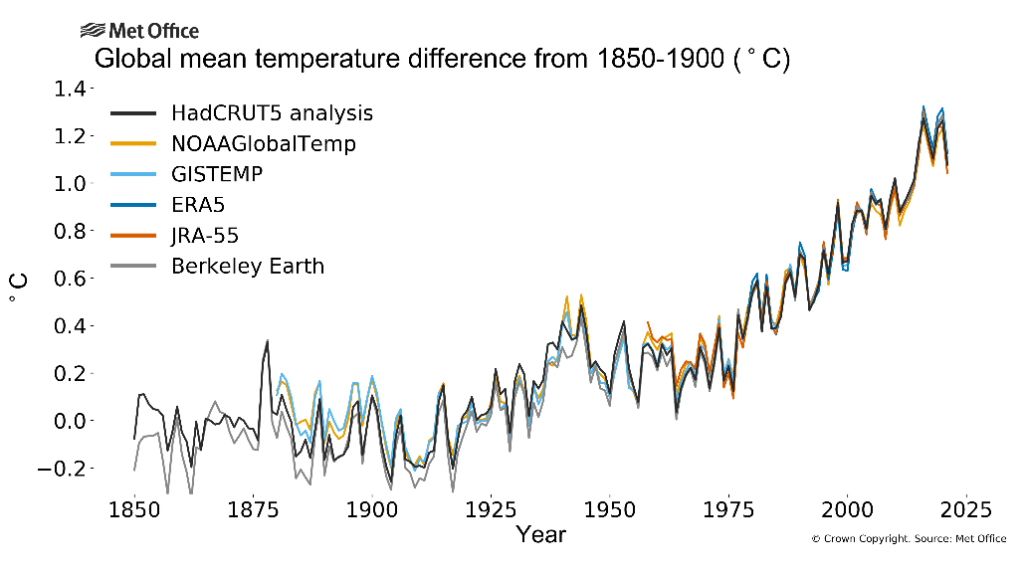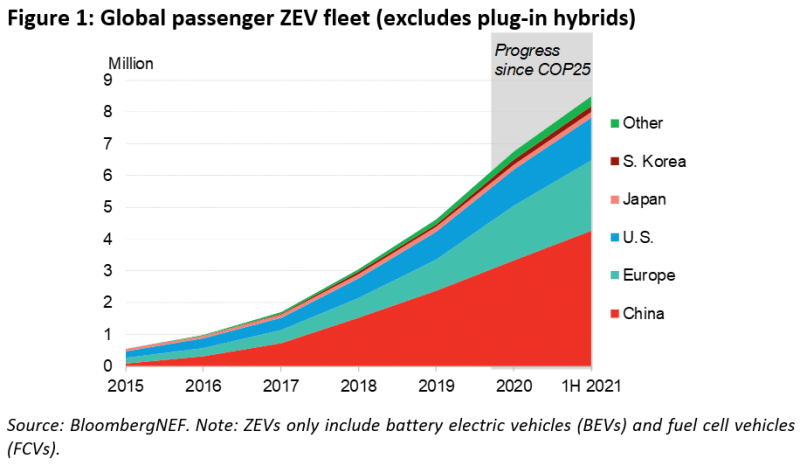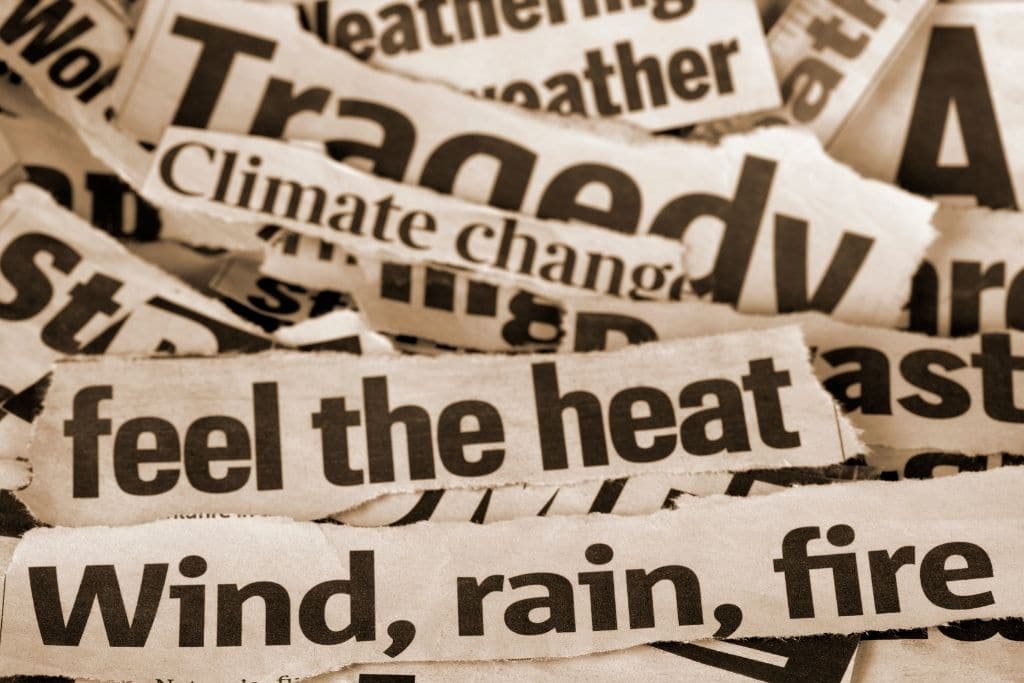2021 was another challenging year. While the COVID-19 pandemic continues to loom, 2021 was also a year filled with unprecedented climate and weather extremes. For some, the effects of climate change have been made clear by what we experienced this year. But for most, it has been an undeniable sign that we are charging towards the tipping point of the climate crisis. World leaders gathered at COP26, the UN climate summit, put their heads together to set out collective pathways to reduce greenhouse gas emissions, managing only to agree upon “phasing down” coal and setting down rules for a global carbon market. This is the decisive decade to fight the climate crisis, and we can strive to do a lot more. We take a look back at some of the biggest climate change events in 2021, and hopefully encourage and galvanise greater climate action in 2022.
—
2021’s Biggest Climate Change Events
Rising Global Temperatures
The global mean temperature for 2021 was 1.08 ± 0.13C above the pre-industrial (1850-1900) average. 2021 has been somewhere between the 5th and 7th warmest year on record globally so far.
More Severe and Prolonged Heat Waves
Unprecedented heat waves affected the west coast of North America throughout June and July, while southeastern Europe including Greece and Italy experienced its worst heat wave in August.
- Lytton in British Columbia saw temperatures soar up to 49.6C on June 29, smashing the previous national record by 4.6C. 569 heat-related deaths were reported in British Columbia alone between June 20 and July 29.
- In California’s Death Valley, which is known to be one of the hottest places on the planet, recorded a temperature of 54.4C on July 9, the highest record in the world since at least the 1930s. The desert valley went on to had its hottest summer on record.
Widespread and More Frequent Wildfires
- The aforementioned Canadian town of Lytton experienced a wildfire that left 90% of the town destroyed. 62 new fires have been recorded in the span of 24 hours.
- Forest wildfires in the Russian city of Yakutsk and 50 other Siberian towns in July caused by a historic hot summer have burned down more than 1 million hectares of land. The region became shrouded in heavy smoke and smog for days on end, forcing many to be housebound.
- In August, Turkey experienced its worst wildfires in at least a decade following a heat wave that swept over southern Europe and other parts of the Mediterranean. Blazes have reportedly burned down at least 95,000 hectares of land and killed eight people.
- Greece similarly faced its worst heat wave since 1987 according to Prime Minister Kyriakos Mitsotakis, sparking wildfires that cost many homes, properties and livestock. As a result, the Greek government set up the world’s first climate crisis ministry to provide disaster relief and adopt policies to help adapt to the effects and impacts of climate change.
Extreme Rainfall and Fatal Flash Floods
- Western Europe including Germany and Belgium battled its worst flooding on record and extreme flash floods in mid-July, caused by a spike in rainfall levels, which rose within minutes. The highest rainfall was recorded at 162.4 mm. At least 180+ people were killed from the floods, with economic losses over USD$20 billion.
- Weeks later, the Henan Province of China experienced its heaviest rainfall event in a millennia where devastating floods killed at least 25 people and displaced 1.24 million residents. The city of Zhengzhou saw 201.9 mm of rainfall in a single hour – a Chinese national record – 382 mm in six hours – and 720 mm throughout the weather event, exceeding its annual average.
Record High Arctic Sea Ice and Glaciers Melt
More mass was lost in 2021 due to rising global temperatures and prolonged heat waves.
- One of the biggest climate change events in 2021 was the massive ice melting event in Greenland during a heat wave in the Arctic, where temperatures rose up to more than 20C above average, resulting in the loss of nearly 27 billion tons of surface mass in July. That amount of loss could have covered the entire state of Florida in two inches of water.
- In the coastal mountains of British Columbia, Place and Helm glaciers lost more mass during the period 2020-2021 than in any year since measurements began in 1965. In the Canadian Rocky Mountains, mass loss from Peyto Glacier was the second greatest since 1965. Causes can be linked to soot and ash from extensive regional wildfire activity in summer 2021, causing the surfaces of the glaciers to be unusually dark, which absorbed more sunlight than usual.

Global sea level rose an average of 4.4 mm per year between 2013 and 2021.
- Due to accelerated sea ice and glacier loss, global mean sea level has reached historic high levels in 2021 since satellite altimeter measurements began in 1993.
Historic Levels of Ocean Acidification
As the world’s oceans absorb around 23% of the annual anthropogenic carbon dioxide emissions released to the atmosphere, ocean waters have become more acidic as a result.
- In 2021, open ocean surface pH has now reached its lowest levels in at least 26,000 years.
Severe and Prolonged Droughts
Significant drought affected much of subtropical South America for the second successive year, as well as the US.
- The Brazilian government declared water shortage in the Paraná hydrographic region as numerous water storages were at or near their lowest levels in 20 years.
- The Southwest of the US lived through its worst drought since record keeping began in 1895, with six states experiencing 100% drought conditions during September. The country’s two largest reservoirs, Lake Mead and Lake Powell are also draining at alarming rates – 47m below full supply level – potentially causing large-scale water shortages with significant socioeconomic costs.
Extreme Tropical Cyclones
- Hurricane Ida made landfall in the US Gulf Coast in late August, and was the second most damaging hurricane to strike the state of Louisiana on record. Remnants of the storm have made their way to the Northeast, where cities like New York saw a record hourly rainfall of 80 mm, with 24-hour totals exceeding 200 mm in parts of the city.
Cold Temperature Records
Despite the other extreme heat wave events, some parts of the world experienced some of its coldest winters on record.
- Between April and September, the average temperature in Antarctica was -60.9C, the coldest on record. The entire continent experienced its second-coldest on record, where temperatures between June and August were 3.4C lower than 1981-2010 average, plunging down to -62.9C.
- Abnormally cold conditions affect many parts of the central United States and northern Mexico in mid-February. On February 16, temperatures in Oklahoma City plummeted down to −25.6 C while Dallas to −18.9 C, their lowest since 1899 and 1949 respectively.
Power Generation from Coal Hit All-time High
- Coal-fuelled power generation is set to jump an average of 9% from 2020, reaching to an all-time high of 10,350 terawatt-hours, according to an International Energy Agency. Coal in the US and the EU rose about 20%, with India climbing 12% and China – the world’s largest consumer – at 9%. The overall increase can be attributed to rising gas prices, making coal more cost competitive.
Increased Rates of Deforestation
- Deforestation rate in Brazil’s Amazon rainforest – the world’s largest and most biodiverse forest – has reached its highest levels in 15 years in the 12 months between August 2020 and July 2021, largely due to Brazilian president Jair Bolsonaro’s lax regulations and attitude, allowing illegally logging, mining and deforestation to soar.
- Growing number of forests, including UNESCO protected forests, are emitting more carbon dioxide than it is absorbing from the atmosphere due to increasing deforestation and wildfires.
Aside from These Climate Change Events, There’s Been Good News
Record Year for Renewables Capacity
despite rising costs for key materials used to make solar panels and wind turbines, 2021 was a record year of growth for renewable energy capacity. Renewables is forecast to reach 290GW, surpassing 2020’s record of 280GW.

- Global Electric vehicles sales soared up to 5.6 million in 2021.
- EV sales increased by 80% this year compared to 2020, totally up to 12 million passenger EVs on the road worldwide. Of that amount, 8.5 million are true zero-emission vehicles (ZEVs), meaning they’re either battery-electric or fuel-cell.
EU Carbon Prices Hit All-time High
- Carbon prices in November have more than doubled compared to levels at the start of 2021. The positive trend comes after COP26 set out rules for a global carbon market, making polluting countries and companies pay for carbon permits and allowing them to trade carbon offset credits.
Rhino and Elephant Poaching Declined
- Poaching rates continue to decline in Africa in 2021, thanks to COVID-19 restriction and enhanced protection efforts.
Landmark Wildlife Trafficking Bill
- Hong Kong, a renowned hub for wildlife trade and trafficking, passed a historic bill treating animal trafficking as a serious and organised crime.
If you liked these climate change events, you might also like: 11 Interesting Facts about Climate Change


















